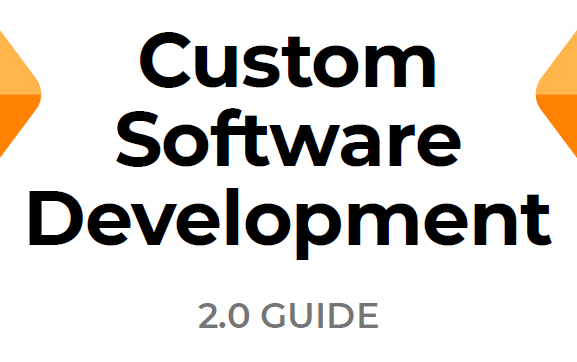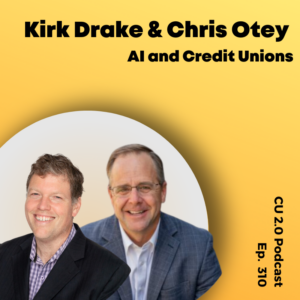This 2.0 Guide is intended to show the state of custom software development for credit unions, including why it’s a viable pathway to digital transformation, common projects, and evaluation strategies for custom development companies. This guide should also offer some perspective about why keeping a development partner is a good idea for any credit union with a robust technological roadmap.
Typically, CU 2.0 champions prebuilt fintech and CUSO solutions as the best path toward digital transformation. However, while fintechs present the easiest solution, they don’t always present the complete one. Frequently, one size doesn’t fit all. Always, credit unions need differentiation as much as (or more than) their members.
The need for custom development work is even more necessary when working with complex tech stacks. Custom work is the best way to ensure your credit union’s technology fits together, behaves as it should, and doesn’t leave product, service, or member experience gaps.
The future of banking is digital. It’s critical for credit unions to keep up with the rest of the market—and members’ expectations—if they’re going to survive. Custom development companies will create and optimize anything that involves zeros and ones so that you can focus on the member.
Ultimately, there are dozens, hundreds, even thousands of shops out there that could work with your credit union. But not all software development providers are created equal, nor do they all understand credit unions, nor do they all specialize the same way. Some handle a handful of spot solutions while others work more broadly. In this guide, we’ll give you some evaluation criteria to help you find the partner that will work best for you.
Check out our new downloadable Credit Union Provider Guides here!
Custom Development Trends and Analysis
- Going beyond staff augmentation.
If you’re solving your software needs with staff augmentation, then you’re responsible for ideating and managing the whole project.
Custom software development projects are both tedious and skill intensive. They require time and expertise that most credit unions don’t have. And it’s not just engineering expertise that credit unions may lack—they may also want for skills that span the entirety of a project, from conception, to management, to design, to development, and more.
Good partners will fill in for more than just missing developer hours. But like staff augmentation, it won’t take a full-time team, and credit unions can simply get what they need, when they need it.
In part, this is because outsourced developers offer access to a wider talent pool than would be available within the credit union. Many firms have access to dozens or hundreds of skilled developers to cover any given need (front end vs back end, Python vs Java, etc.).
In turn, that talent pool offers flexibility. By outsourcing, credit unions avoid hiring, onboarding, and training full-time employees in favor of specialists who are ready to go almost immediately. Not only does this save money, but it also ensures that credit unions aren’t locked into pursuing projects that fit existing employee skillsets. All this results in leaner credit unions that can better focus on their core business. Dev projects won’t distract from other duties, nor will they be put on the back burner as other priorities bubble up.
- Expanding digital offerings.
As more people pay with their phones, invest digitally, open accounts on vacation, and apply for loans or credit outside of work hours, credit unions must be able to meet these now-normal banking habits.
Credit unions can bring on new solutions by:
- Partnering with a fintech or CUSO;
- Creating the solution themselves; or
- Outsourcing a team to build the solution.
No matter the strategy, credit unions will need to connect the new tech to the rest of their stack. They may also need to modify or augment things to better fit their needs.
Custom development companies can integrate, configure, and deploy fintech solutions. They can do so quickly, efficiently, and at scale, allowing credit unions to accelerate projects and advance digital transformation timelines. So, even when using a fintech or in-house solution, outsourced developers can expand access to new products and services. Furthermore, the outsourced team will have the bandwidth to enhance products, streamline UX, and ensure functionality.
- Smooth operations.
Not all custom development work is flashy and member-facing. A good deal of it may improve the member experience indirectly, without them ever knowing what it took to make your credit union such a well-oiled machine.
So, although apps, products, and member-facing services are flashy, the core of credit union business stands to benefit massively from custom development.
Improved efficiency is one key operational improvement that developers make. For example, automating tedious, complex workflows allows one person to accomplish hours of work with a click of a button. This improved efficiency can dramatically improve anything from the lending process to reporting. Similarly, fraud and compliance solutions (e.g. to improve KYC and onboarding) are necessary and increasingly common targets for custom software solutions. Ditto for solutions detecting and preventing fraudulent activities (such as unauthorized access to accounts, identity theft, and other financial crimes).
- Team size matters.
Custom software development shops come in all sizes, and each team size comes with its own pros and cons.
a. Small companies are the mom-n-pop shops of the industry. Their benefits include high attention to individual accounts, low turnover, and often highly specialized skillsets. Their downsides are that they may not have capacity to take on much at a time, could have longer completion times, may require more CU involvement, and might lack necessary competencies outside of their areas of emphasis.
b. Mid-size companies offer diverse skillsets and agile development capabilities. These companies have access to a deep enough bench that they can cover all required skillsets and handle multiple aspects of any project or road map, including ideation, QA, front end, back end, devops, project management, staff augmentation, etc. Downsides include team assembly time that could delay start times and higher developer turnover potential.
c. Large companies have a deep bench of full-time talent and support. The plusses of working with bigger companies include thorough contracts, access to diverse skillsets, and extensive track records. The pitfalls include slow and rigorous contracting, high cost, lack of agility, and they often come with long contract periods.
CU 2.0 generally recommends mid-size companies because they fit a sweet spot of capability, flexibility, speed, and cost. However, your needs may necessitate more or less institutional size, and your mileage may vary.
Evaluation Strategies
Unlike most of our 2.0 Guides, our Custom Software Development guide will make no attempt to suggest credit union ROI or member experience. Outcomes will depend not only on the organization hired, but also on the credit union’s vision and project management. In short, there are too many variables!
With that in mind, it’s important to find a custom software development partner that best fits your needs. The following questions and considerations may help you narrow down the field to find the right team.
Tenure
How long has the organization been in business? Can you trust that they’ll still be around a year or two in case you need help again?
Social Proof
Who else has the organization worked for? Do they have testimonials or case studies? Are they familiar with the needs of larger organizations, financial institutions, or specifically, credit unions?
Specific Experience
Does the company have experience working on similar projects at other institutions? Do they have competency in the areas of need for the project, such as front end, back end, Python, agile, etc.?
Cost
How much does the organization charge? What will the project cost? Does their pricing structure differ significantly from competitors? Why?
Competency
Can the developers point to other successful projects they’ve completed? Can they fill in knowledge gaps or suggest improvements to the project?
Number of Projects
How many projects do you have on your roadmap? Are you sure you have limited needs, or would you be better served by a long-term partner who could handle a wider array of project types?
Team Size
How big is the organization’s team? When will they be able to get started? How long will it take them to finish? What kind of access to talent do they have?
Specialist vs Generalist
Does the company usually work within a few industries? Does it offer only specific solutions? Do they offer only select services or capabilities?
Fintech Ratings
CU 2.0’s rating methodology for our early guides is very simple. We approximate on 3 variables: Size, Flexibility, and Credit Union Experience (CUX). Higher numbers correlate to greater magnitude.
The scale goes from 1 to 3. Scores of 0 indicate a not applicable (N/A) or competitive solution.
Our impact ratings don’t necessarily correlate to the quality of a given solution. Fintechs with higher potential impact scores aren’t automatically better, or a better fit, for your credit union and members.
Fintech Ratings
The following development first are listed alphabetically. These ratings correspond only to the three listed variables (Size, Flexibility, and CUX). These aren’t ranking of quality, nor are they recommendations—they’re meant only to serve as a starting point in your research to find a viable development partner.
Trusted solutions are highlighted with an asterisk—these are fintechs that CU 2.0 has vetted personally.
See more ways to evaluate fintech lending providers in our downloadable 2.0 Guide here.
Credit Union Developer Guide
| Organization | Description | Size | Flexibility | CUX |
| Andersen | Andersen includes custom software development in its range of banking solutions list. | 3 | 3 | 1 |
| Aspire Systems | Aspire Systems offers a broad range of software development solutions to a variety of industries. | 3 | 3 | 2 |
| Avenga | Avenga offers custom product development, maintenance, support, and staff augmentation. | 3 | 3 | 1 |
| CU Solutions Group | CU Solutions Group is a CUSO that offers full custom solution development alongside its other products. | 2 | 2 | 3 |
| CU*Answers | CU*Answers includes custom app development along with ready-made CU-specific products. | 2 | 2 | 3 |
| CU*South | CU*South offers custom software development in addition to a handful of core solution (emphasis on core). | 2 | 2 | 3 |
| Eleks | Eleks is a large custom software development company with experience in financial services. | 3 | 3 | 1 |
| fi-linx | fi-linx is a CUSO that creates select custom software for credit unions. | 1 | 1 | 3 |
| FintechOS* | For DIYers, FintechOS’s no-code platform allows CUs to configure and launch countless new products and experiences in just 12 weeks. | 1 | 1 | 2 |
| Itexus | Itexus builds custom solutions for select industries, including fintech and credit unions. | 3 | 3 | 2 |
| JSGuru | JSGuru specializes in the ideation, design, and development of complete custom solutions for businesses. | 3 | 2 | 1 |
| Kanda | Kanda provides bespoke digital transformation and software solutions to a broad range of industries. | 3 | 3 | 1 |
| Keeper Solutions | Keeper Solutions works with fintech and medtech companies to build custom software. | 3 | 2 | 1 |
| Nueve Solutions | Nueve Solutions offers a few specialized services for credit unions to complement their broader development capabilities. | 2 | 2 | 3 |
| SMA Technologies | SMA Technologies specializes in workflow and process automation in complex credit union tech stacks. | 3 | 1 | 3 |
| Tailwind Business Ventures* | Tailwind’s custom development strategy, “Software-as-a-Relationship,” offers a broad array of skills and deep credit union experience. | 2 | 3 | 3 |
| Technology Happens | Technology Happens specializes in credit union custom software, staff augmentation, and consulting. | 2 | 3 | 3 |
| Zoolatech | Zoolatech specializes in custom software engineering and design for retail, finance, and select other industries. | 3 | 3 | 1 |
Please note that these ratings are in their early stages and will be updated as we include more data and more complex variables. The ratings are not definite—your credit union could see a different level of impact than listed in this guide.
Did we miss a fintech? Please let us know at info@cu-2.com
Recommendations
Choosing the right partners to leverage fintech lending capabilities and efficiencies will depend on your goals, budget, timeline, and other factors. The shop that works for the credit union down the street may not be the best fit for you.
However, we are comfortable extending a rare recommendation to include Tailwind in your list of potential partners. We’re impressed with their track record with credit unions, and their driving philosophy matches the credit union motto of people helping people.
For deeper discussion, analysis, and recommendations, CU 2.0 can help in the following ways:
- Join our Fintech Call Program. In quarterly 30-minute calls, we’ll discuss in depth new and innovative fintech solutions that fit your credit union’s needs. We can also help you review other solutions you’re looking at.
- Ask for an introduction. We maintain relationships with most or all of the vendors rated above. We would be happy to give you a warm introduction to any we can on the list.
- Book a consultation. CU 2.0 offers technology and fintech consultations and reviews to identify best-fit solutions for your credit union.




